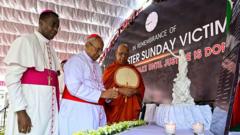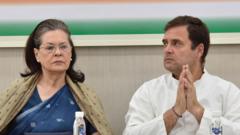The integrity of India's electoral process is under scrutiny as opposition parties, spearheaded by Rahul Gandhi, allege widespread "vote theft" favoring the BJP in the 2024 elections. The Election Commission vehemently denies these claims, leading to significant political turmoil.
Allegations of Electoral Manipulation Stir Indian Political Tensions

Allegations of Electoral Manipulation Stir Indian Political Tensions
Opposition leaders, led by Rahul Gandhi, raise concerns over alleged vote manipulation favoring the BJP in the recent Indian elections, igniting a heated political debate.
A political storm is brewing in India following serious allegations of "vote theft" during the 2024 general elections. Opposition parties have accused the Election Commission of India (ECI) of facilitating irregularities that they claim disproportionately benefited the ruling Bharatiya Janata Party (BJP). The situation escalated on Tuesday when parliament was adjourned after opposition MPs insisted on a debate concerning the fairness of India's electoral system. This came just a day after a significant number of opposition politicians, including Congress leader Rahul Gandhi, were temporarily detained while attempting to march to the ECI's headquarters in Delhi.
Rahul Gandhi first articulated these concerns during a press conference on August 7, highlighting what he described as systematic voter manipulation from data provided by the ECI itself, although both the ECI and the BJP have rejected his assertions vigorously. Despite Prime Minister Narendra Modi's securing a historic third term, the BJP-led coalition did not achieve the sweeping majority that had been anticipated. Voter turnout reached an impressive 66%, with close to a billion registered voters in what is considered the largest electoral exercise globally.
Gandhi pointed to discrepancies in the voter rolls, specifically in Mahadevapura, a locality within the Bangalore Central constituency. He claimed there were over 100,000 manipulated entries, including duplicate voters, invalid addresses, and mass registrations of multiple voters at single locations. Unique cases, such as a voter named Shakun Rani allegedly voting twice, were brought up, but the ECI disputed this narrative. Gandhi also claimed evidence of deleted CCTV footage from polling stations and highlighted an instance where 80 individuals were registered at the same residential address. He contended that such anomalies resulted in the Congress party's loss of at least 48 seats in the election, arguing that the ECI failed to uphold the "one man, one vote" principle.
The Congress party managed to secure 99 out of 543 seats, compared to the BJP's 240. In response to Gandhi's claims, the ECI labeled the allegations "absurd" on social media and demanded either a formal retraction from Gandhi or a signed sworn statement corroborating his claims. Additionally, the ECI's Karnataka unit pointed out that the Congress party did not file any formal objections while revising the electoral rolls prior to the elections, which further intensified the dispute.
As the political landscape continues to heat up, the fallout from Gandhi's allegations is particularly significant against the backdrop of a recent revision of electoral rolls in Bihar, where a crucial election is slated for November. The Special Intensive Revision (SIR) conducted from June to July involved verification of all 78.9 million voters, marking the first comprehensive update since 2003. While the ECI has asserted that the initiative targets deceased and duplicate voters, critics contend that the expedited nature of the process has disenfranchised numerous individuals, especially among minority groups and migrants.
Many voters have reported inaccuracies in the draft rolls, which allegedly feature wrong photographs and even deceased individuals. Concurrently, India's Supreme Court is considering several petitions challenging the SIR and the removal of approximately 6.5 million names from voter rolls. While the ECI states that most removals are due to deaths, duplicates, or migrations, the court has remarked that much of the disenfranchisement concerns a "trust deficit."
On August 12, Gandhi escalated his claims, suggesting a more coordinated national-level manipulation of voter rolls, highlighting the bizarre case of a voter listed as 124 years old in Bihar's electoral register. He emphasized, “There are unlimited cases like that. 'Abhi picture baki hai' [the story is not over yet].” As the situation unfolds, the potential implications on India's political climate remain profound.


















